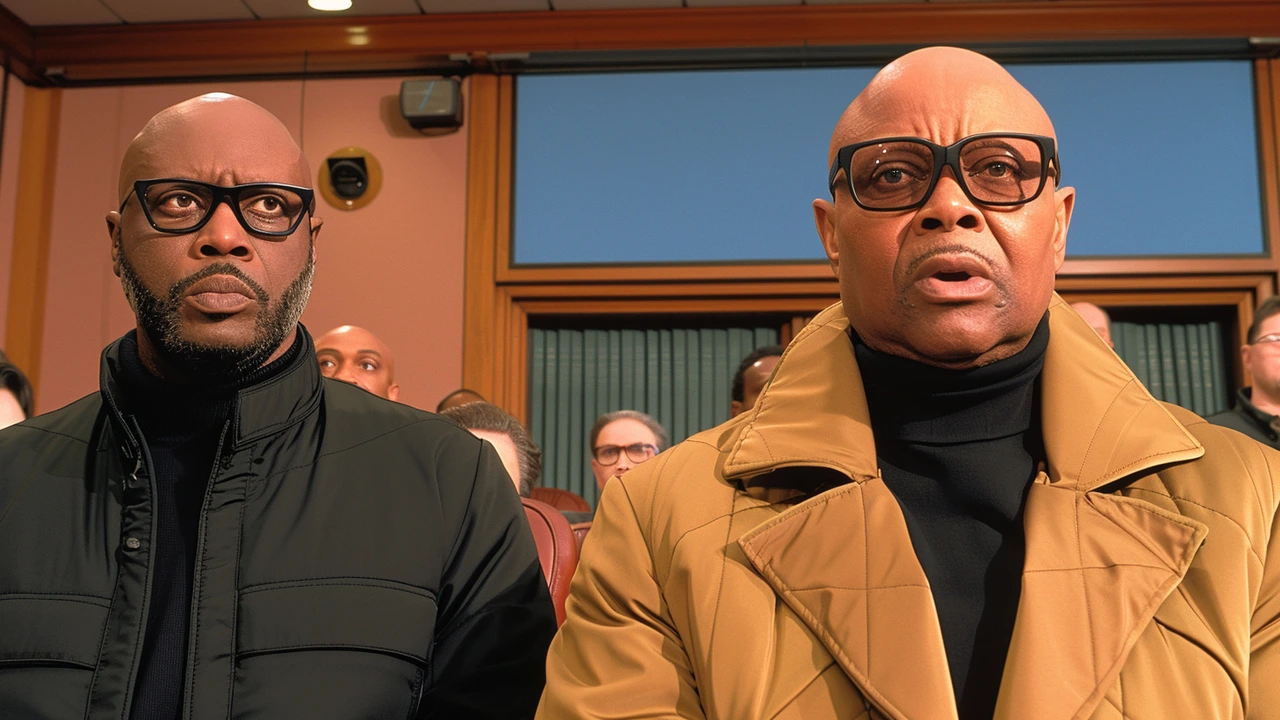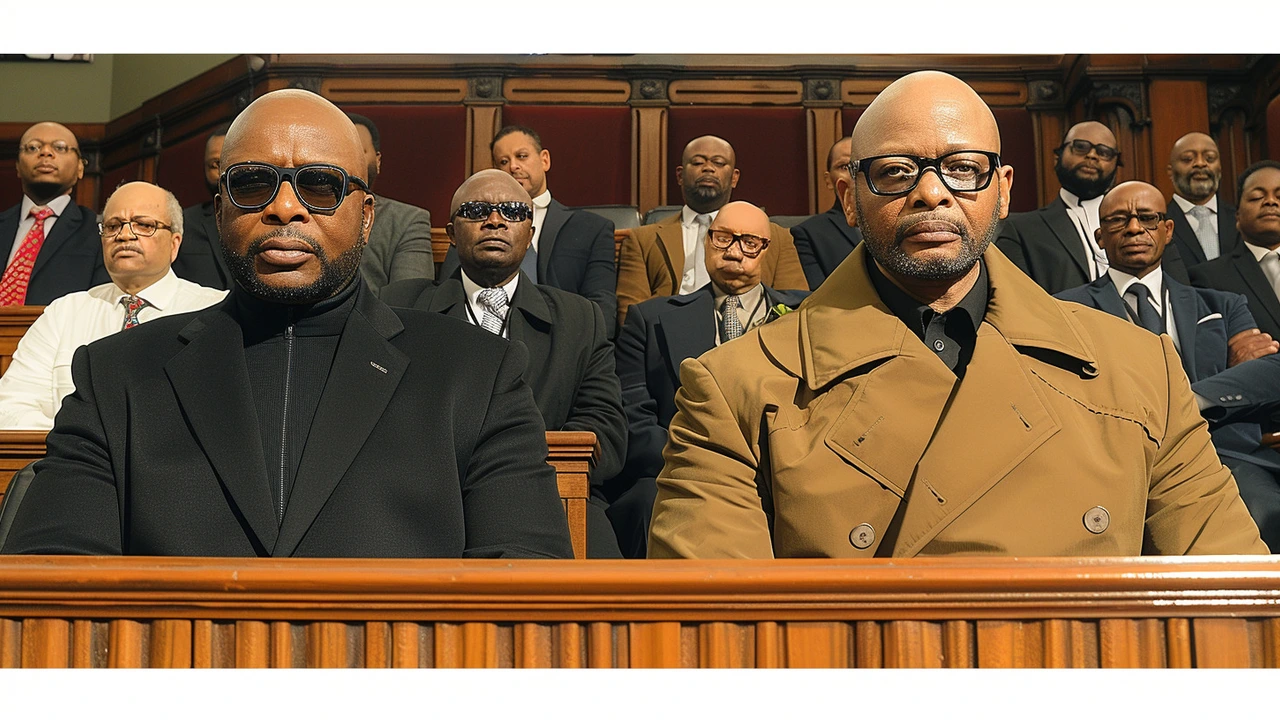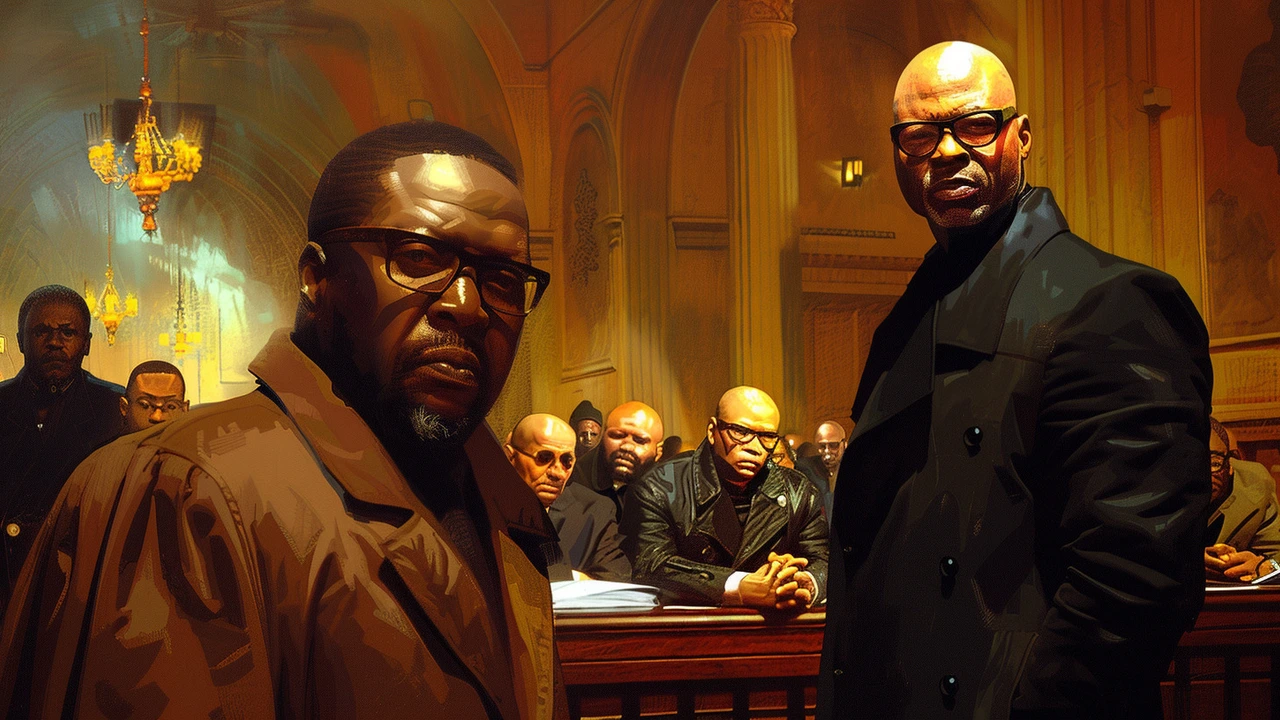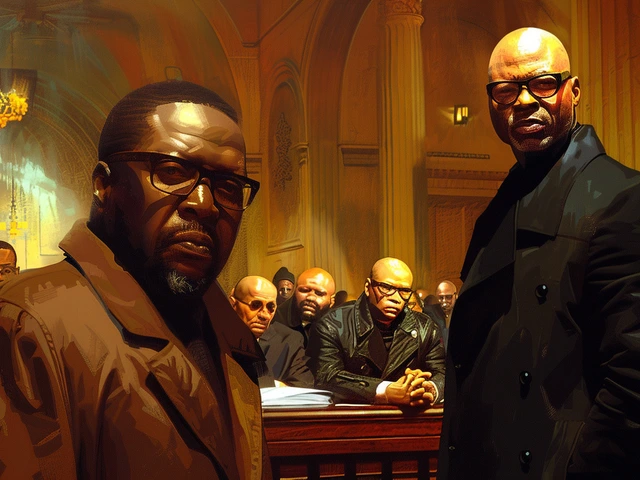Corruption Allegations Surface in South Africa
In an unfolding saga that places the spotlight on corruption, a high-profile case involving former ANC spokesman Zizi Kodwa and businessman Jehan Mackay has emerged. Key to the case is a series of emails exchanged between the two, allegedly discussing government tenders and substantial financial transactions. These communications are the cornerstone of the prosecution's case, purporting to show misconduct and undue influence within the inner workings of South African politics.
The foundation of the allegations originates from a 2015 email in which Mackay reportedly requested Kodwa's intervention in a tender process. Mackay claimed his company had initially ranked first but was subsequently disqualified. This appeal to Kodwa's influence is said to exemplify the purported corruption and the lengths to which some individuals may go to secure lucrative government contracts.
Details From the Emails
One email in particular stands out. Sent by Mackay to Kodwa, it is claimed to contain a direct request for help in reinstating a tender that had been initially successful but later dismissed. This email was allegedly written with the clear anticipation that Kodwa would leverage his political connections to resolve the issue in Mackay's favor. The implications of such correspondence are severe, hinting at a systemic issue within the tender process. The prosecution argues that it portrays an abuse of power and a breach of ethical conduct expected from the role that Kodwa held at the time.
Beyond the email exchanges, financial transactions between the two men are under scrutiny. It is alleged that Mackay made payments totaling R1.68 million to Kodwa. This sum includes payments for luxury accommodations in Cape Town and a substantial R1 million payment reportedly used to purchase a Jeep in Sandton. According to the court’s records, these payments are said to have been disguised as legitimate business expenses but are now being presented as evidence of corruption.

The Courtroom Drama
The Palm Ridge Specialised Commercial Crime Court has become the stage for this high-stakes legal battle. The allegations and the evidence are being meticulously dissected. In their defense, both Kodwa and Mackay have pleaded not guilty to the charges laid against them. Their defense strategies hinge on discrediting the prosecution’s interpretation of the emails and the financial transactions.
Kodwa's defense has asserted that he was unaware that the luxurious accommodations in Cape Town were rented properties. He believed, according to his statement, that these accommodations belonged to Mackay. This claim aims to weaken the suggestion that the luxury stays were a quid-pro-quo arrangement. Mackay's payments to Kodwa, including the hefty sum supposedly used for purchasing a Jeep, are portrayed by the defense as unrelated to any improper influence on tender processes or government contracts.
Bail and Subsequent Court Orders
Despite the ongoing legal proceedings, both men were granted bail, each set at R30,000. As conditions of their bail, they are required to surrender their passports and are prohibited from contacting any witnesses related to the case. This measure is standard in cases where there is a possibility of witness tampering or flight risk.
The court proceedings are far from over. As the case continues, it will likely unravel further details about the inner workings of the alleged corruption. The legal teams on both sides are gearing up for an extensive battle, and the South African public remains riveted, watching closely as the courtroom drama unfolds.

Implications for South African Politics
This case raises significant concerns about corruption within South Africa’s political landscape. The accusations against a high-ranking former spokesman for the ANC reflect broader issues within the systems that govern tender processes and business dealings. The allegations against Kodwa and Mackay could have far-reaching consequences, potentially spurring reforms aimed at increasing transparency and accountability.
As the trial progresses, there will likely be increased calls for stringent measures to combat corruption and to ensure that those in positions of power adhere to the highest ethical standards. South Africans might expect more rigorous oversight on tender processes and more substantial penalties for those found guilty of corrupt practices. The outcome of this trial could serve as a catalyst for change, impacting not only the political sphere but the business environment as well.
A Nation Watching Closely
The public interest in the case is palpable. Beyond the courtroom, it has sparked discussions about the integrity of public officials and the mechanisms in place to prevent the abuse of power. The emails exchanged between Kodwa and Mackay, now exposed to public scrutiny, are seen by many as indicative of a deeper, systemic problem. For a country grappling with the ramifications of past corruption scandals, this case is seen both as a potential watershed moment and a measure of how far the nation has yet to go in tackling corruption effectively.
This story is not just about Zizi Kodwa and Jehan Mackay; it is a narrative that reflects the ongoing struggle against corruption in South Africa. It symbolizes the challenges faced by the country in ensuring fair and transparent governance. While the courts have the monumental task of delivering justice, the ultimate test will be in the reforms that follow and the continued vigilance of the South African people in holding their leaders accountable.
Looking Ahead
As the legal proceedings continue, attention will remain fixed on the evidence presented and the defenses mounted by both parties. The email exchanges, financial transactions, and courtroom testimonies will be scrutinized in detail. Observers will be keen to see whether the prosecution can firmly establish the link between Mackay’s payments and any undue influence exerted by Kodwa.
The progress and outcome of this case will be significant not just for those directly involved but for the broader context of South African politics and business practices. The anticipation is that it will set a precedent for handling similar cases in the future, potentially leading to a ripple effect that reforms how business and politics intersect in the country.
In conclusion, the trajectory and resolution of this case will likely be remembered as a crucial chapter in South Africa's ongoing journey toward greater transparency and accountability. With the nation’s attention riveted on the courtroom, the unfolding story of Zizi Kodwa and Jehan Mackay serves as both a cautionary tale and a beacon of hope for substantive change in the fight against corruption.








Mayur Karanjkar
June 6, 2024 AT 19:48The epistemic framing of governance mandates a rigorous audit of patronage vectors, lest systemic opacity proliferate. By dissecting the transactional substrata, we elucidate the latent asymmetries that erode institutional fidelity. It's a clarion call for algorithmic transparency.
Sara Khan M
June 6, 2024 AT 22:35Wow, another scandal 🙄.
shubham ingale
June 7, 2024 AT 01:22Let's keep our eyes on the process and hope the truth wins! 🚀
Ajay Ram
June 7, 2024 AT 06:55When we peer into the vortex of state‑owned procurement, we encounter a tapestry woven with threads of influence, ambition, and, inevitably, compromise. The emails that have surfaced act as a cartographic record of a hidden cartography, mapping the routes through which power may be brokered. Each line of correspondence, while seemingly mundane, bears the weight of precedent; it reminds us that the subtle nudges of a former spokesperson can echo across the corridors of municipal contract awards. In sociopolitical theory, this phenomenon aligns with the concept of “networked patronage,” where personal affiliations become conduits for economic advantage. Consider the R1.68 million that allegedly moved between Mackay and Kodwa: beyond the raw figures lies a narrative about the commodification of access. The purported luxury accommodation in Cape Town, for instance, raises a question of intent-was it a hospitality gesture or a transaction cloaked in the language of business expense? Moreover, the Jeep purchase claim speaks to the symbolic capital associated with mobility, status, and the ability to navigate both literal and figurative landscapes of power.
Legally, the prosecution's reliance on electronic evidence must grapple with the admissibility standards, chain‑of‑custody considerations, and the potential for selective interpretation. Defence teams frequently argue that context is king, that a phrase like “help me out” may be benign in a collegial setting. Yet, when such a phrase is paired with sizeable cash flows, the inferential bridge becomes harder to dismiss.
From a governance perspective, the case underscores a glaring need for institutional checks. Transparent tender processes, independent audit trails, and robust whistleblower protections are not merely procedural niceties-they are the scaffolding that prevents a single node from bearing disproportionate influence. As South Africans watch this courtroom drama unfold, the public discourse may well crystallize around demands for tighter regulatory oversight.
In the broader African context, this episode mirrors a pattern where nascent democracies wrestle with the lingering shadows of patronage politics. The outcome, whether conviction or acquittal, will reverberate beyond the courtroom, potentially shaping future legislative reform and civil society activism. Ultimately, the saga is a reminder that the health of a polity is measured not just by the presence of scandals, but by the robustness of its response to them.
Dr Nimit Shah
June 7, 2024 AT 18:02From the perspective of national integrity, any insinuation that a senior ANC voice could be swayed by private coffers is a direct affront to our collective aspirations. While the narrative may appear sensational, it's essential to sift through the rhetoric and judge based on factual matrices, not mere headlines. The prosecution's strategy seems keen on painting a picture of systemic decay, but we must remain vigilant against oversimplified vilification. In the end, justice should be blind, irrespective of partisan affiliations. Let's hope the courts stay grounded in law, not politics.
Ketan Shah
June 8, 2024 AT 13:28The procedural aspects of this case merit close scrutiny, especially regarding the authentication of the email metadata. It would be instructive to examine whether the custodial chain was preserved without alteration, as any breach could undermine evidentiary weight. Additionally, the financial trail-if traced through official banking records-could either corroborate or refute the alleged quid‑pro‑quo. I look forward to seeing the forensic accountants' findings. Such transparency will aid public understanding of the legal nuances involved.
Aryan Pawar
June 9, 2024 AT 20:02We gotta stay hopeful that the truth will cut through all the noise. The courts do their thing and the people will see what’s real. Even if it seems messy keep faith in the process
Shritam Mohanty
June 11, 2024 AT 08:08Look, the whole thing smells like a staged distraction. The powers that be love a good scandal to keep us occupied while they pull the strings behind the curtain. Those payment trails? Probably fabricated to give the illusion of corruption while the real deals happen out of sight. Wake up, folks-this is just a smokescreen.
Anuj Panchal
June 13, 2024 AT 07:22From a policy‑analysis viewpoint, the alleged tender manipulation highlights the need for a robust risk‑assessment framework within procurement cycles. Embedding blind‑spot detection mechanisms could preempt similar episodes. Moreover, establishing an independent oversight body with statutory authority would provide an additional layer of accountability, reducing reliance on ad‑hoc judicial intervention.
Prakashchander Bhatt
June 15, 2024 AT 20:28Even if the allegations are heavy, it's crucial we keep a balanced perspective. There's always room for due process, and every side deserves to be heard. Let's stay optimistic that the system works.
Mala Strahle
June 18, 2024 AT 17:55I find it troubling that the discourse often reduces complex governance failures to mere gossip. While personal misconduct is undeniably serious, we must also interrogate structural vulnerabilities that enable such conduct. The interplay between political patronage and corporate interests cannot be ignored, as it shapes the strategic calculus of both actors. Moreover, the media's framing tends to amplify sensational aspects, sometimes at the expense of nuanced policy discussion. This is a pivotal moment to demand systemic reforms rather than solely focusing on individuals.
shubham garg
June 22, 2024 AT 05:15Great points, Ajay. The legal intricacies are fascinating, and they’ll set a precedent for future cases.
LEO MOTTA ESCRITOR
June 27, 2024 AT 04:42Absolutely, and it's encouraging to see thoughtful analysis emerging from the community.
Sonia Singh
July 2, 2024 AT 15:15Hmm, not sure why we keep using emojis for shock value 🙃.
Ashutosh Bilange
July 8, 2024 AT 18:28Yo this is like the biggest drama everkkk! I cant even with all the lies and thigns lol.
Kaushal Skngh
July 15, 2024 AT 17:08Another day, another headline. Seems like nothing changes.
Harshit Gupta
July 24, 2024 AT 09:28Patriotism isn't a badge you wear while ignoring corruption. If we truly love our nation, we must hold every official accountable, no matter how high they climb.
HarDeep Randhawa
August 3, 2024 AT 19:28Interesting-did they ever consider the possibility that the emails were fabricated?; The forensics could reveal alterations; readers should demand a full chain‑of‑custody report!!!
Nivedita Shukla
August 13, 2024 AT 01:42All this chatter just proves my point about endless cycles of outrage.